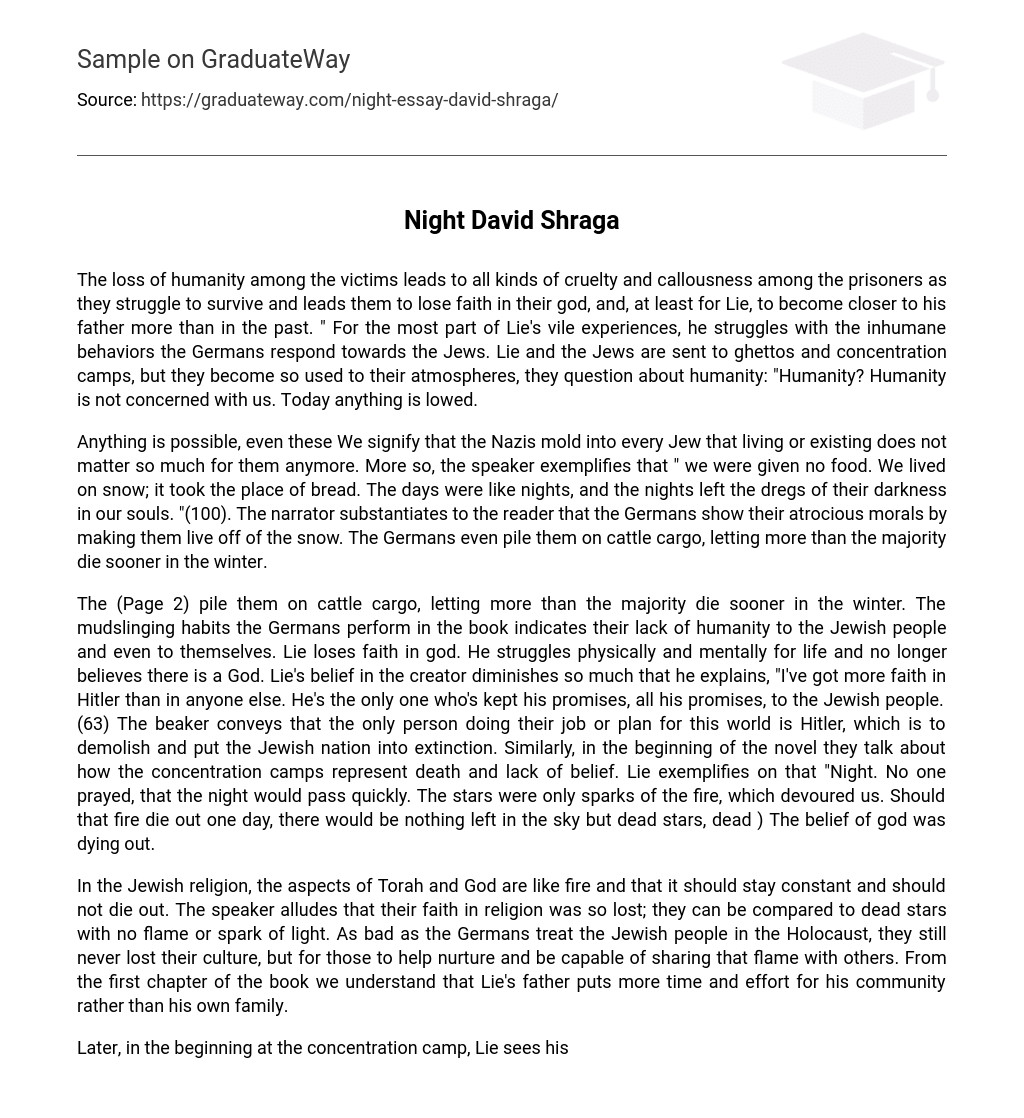The victims’ loss of humanity results in various forms of cruelty and callousness among the prisoners as they fight for survival. This loss also causes them to lose faith in their god and, in Lie’s case, brings him closer to his father. Throughout most of Lie’s horrific experiences, he grapples with the inhumane treatment the Germans inflict upon the Jews. Both Lie and the other Jews are sent to ghettos and concentration camps, where the harsh conditions become almost routine. As a result, they start questioning the existence of humanity, realizing that they are no longer regarded as human beings. “
It is emphasized that anything is possible, including the Nazis treating every Jew as if their lives no longer hold significance. The speaker illustrates this by stating, “we were given no food. We lived on snow; it took the place of bread. The days were like nights, and the nights left the dregs of their darkness in our souls” (100). This demonstrates how the narrator provides evidence to show that the Germans display their cruel morals by forcing them to survive on snow. Furthermore, the Germans subject them to harsh conditions by overcrowding them onto cattle cargo, resulting in a significant number of deaths during the winter.
The text reveals the inhumane treatment of Jewish people by the Germans, particularly in regards to their handling of cattle cargo during the winter. This lack of compassion is reflected in their mudslinging habits. As a result, Lie loses his faith in God and struggles both physically and mentally for survival. His diminishing belief in a higher power leads him to place more trust in Hitler, who he believes is the only one keeping his promises to the Jewish people. Through the symbol of a beaker, Lie expresses that Hitler’s plan is to extinguish the Jewish nation. The concentration camps are also depicted as representations of death and a lack of belief. Lie remarks on the absence of prayer during those dark nights, likening the stars to dying sparks from a fire that devours them. The fading belief in God is emphasized.
The Jewish religion likens the elements of Torah and God to fire, underscoring their enduring significance. The speaker posits that their faith has diminished to the point where it resembles extinguished stars devoid of light. Despite enduring extreme persecution by Germans during the Holocaust, Jews managed to safeguard their culture and extend its influence to others. The opening chapter of the book shows Lie’s father prioritizing his community above his own family, dedicating more time and energy towards them.
Later in the concentration camp, Lie witnesses his father being beaten by Ides, causing him to feel anger towards his father for not knowing how to avoid the outbreak. Due to the harsh life in the camp, Lie has become hardened and lacks sympathy for his father’s suffering. He fears that intervening would only bring more pain upon himself. Despite this, Lie mentally taunts those causing harm and desires to seek justice for his father’s illness. Although he wants to strangle the doctor and others responsible, his cries remain stuck in his throat. The author reveals the profound grief he feels for his father’s pain, but the indifference of the doctors prevents him from seeking vengeance and ultimately intensifies his sorrow.
Despite the great suffering experienced by Lie and his father while they were in the Holocaust, their unity became stronger and seemingly unbreakable until his father passed away. According to Lie, the decline of their relationship as father and son is especially agonizing because it signifies the last obstacle between a world that still maintains some semblance of normality and one that has been completely overturned. Even though they were dehumanized and deprived of their culture, Lie admits to losing faith in God but continues to cling onto hope, which he compares to a feeling of tranquility.
According to Lie, peace is not bestowed upon us by God but rather something that we can bestow upon one another. Despite the German government’s disregard for the Jewish people and their punishment of those who attempted to save them, Lie emphasizes the significance of reminding Germans that peace is a mutually achievable goal. This message aims to underscore that even though their moral compass may have been skewed, there are still individuals who grasp the concept of righteousness.





